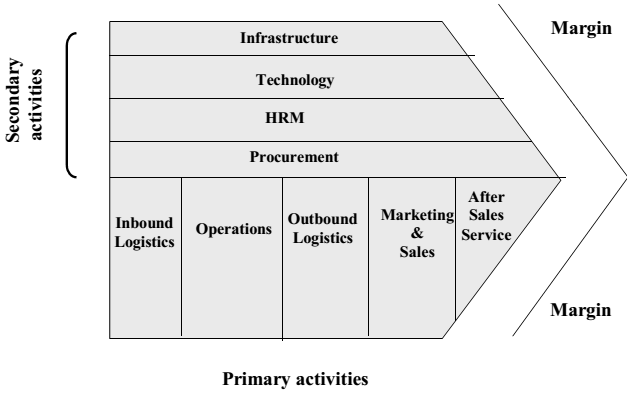What are the activities of value chain analysis?
Activities are business activities the organisation manages so as to add value for example, the product or service is worth more than the cost of the particular parts or resources used to give this, it allows a margin to be earned through the organisation.
A value chain is the order of business activities by that, in the perspective of the ending user, value is added to the services or products produced through an organisation.

Activities in value chain analysis
Inbound logistics:
Business processes that obtain handle and store inputs for example warehousing, inbound transport and stock control.
Operations
Business processes that convert inputs to output for example materials, machines and staff used to assemble the last product, or give a service.
Outbound logistics
Business processes that deliver the actual product (output) while this leaves the organisation, for example, transport of goods to the customer and outbound storage.
Marketing and Sales
Business processes of selling, researching customer requirements and development of an effectual marketing mix for example, product characteristics, place, price and promotion, to satisfy customers.
After sales service
Business processes which deal with returns and complaints as well as customer support after the product or service (output) has left the organisation for example, customer service and support teams, warranty and repair departments to supply elements or consumables, as well as after sales servicing.
Procurement
Business processes to manage and bargain the acquisition of resources or as inputs for the primary activities for example, components, equipment and raw materials. Makes sure resources that are needed are in the right place at the exact time and right cost for example, purchasing departments.
Technology development
Business processes needed for innovation, product testing and design, or the invention of new processes for example, research and development (R and D) departments.
Human resource management (HRM)
Business processes to obtain and look after the organisations mainly valued asset ‘its staff’ for examples, staff recruitment, development, selection, training, induction, retention, reward systems, maintenance and the appraisals of staff records.
Infrastructure
Business processes to maintain of the whole of the value chain and not belonging to some of the other eight categorisations of procedures above for example, head office, finance, legal, IT, quality control, buildings maintenance and staff canteen and many more.